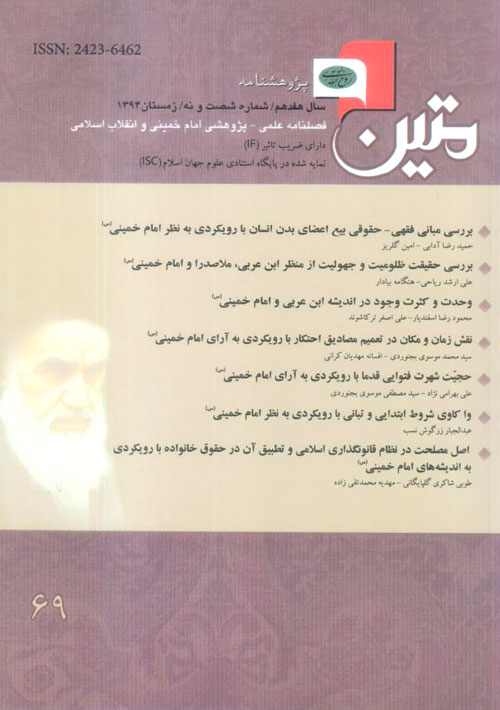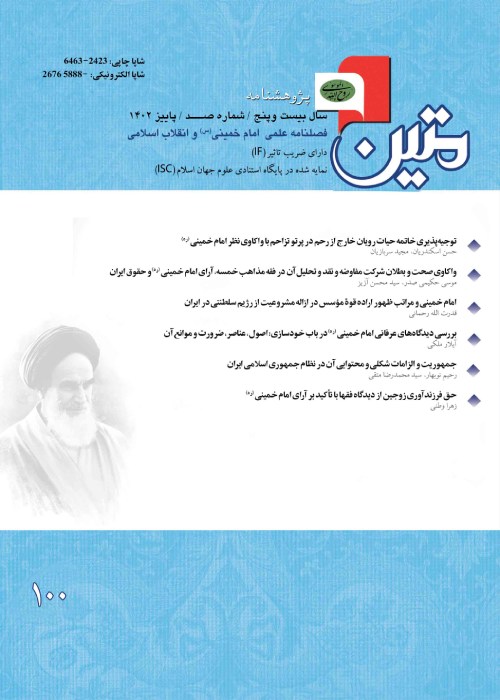فهرست مطالب

پژوهشنامه متین
پیاپی 69 (زمستان 1394)
- بهای روی جلد: 10,000ريال
- تاریخ انتشار: 1395/01/21
- تعداد عناوین: 7
-
-
Page 1Upon rapid development in various sciences and upon the appearance of new questions on legal and jurisdictional issues the researchers are obliged to find answers to these questions to remove the probable ambiguities based on the role of Ijtihad or religious imitation in time and place, reasoning and deduction. The sale of body organs is among the issues that has emerged after the development of medical sciences. It is highly important to legally and religiously reject or justify the sale of body organs particularly when transplant is needed. This paper has been developed based on dynamic jurisprudence and according to the views of Imam Khomeini, who believed in the effect of time and place in jurisprudence, and finally concludes that as far as the sale of body organ is not to the detriment of the givers self, it will be permissible.Keywords: sale, body organs, inherent ownership, to the detriment of “self”, the conduct of the judicious ones
-
Page 21A study of the meaning and truth of unfairness and ignorance, according to Verse 72 of the Ahzab Chapter of the holy Quran which has led to the acceptance of the divine trust, is the main subject of this research. The main focus of this article is to study the viewpoints of Ibn Arabi, Mulla Sadra and Imam Khomeini about this issue. Documental research method was applied and the necessary data were collected from books and journals. The findings of the research indicate that although the words unfairness and ignorance are from etymological point of view censuring in nature, in Inb Arabis viewpoint and in transcendental philosophy, by divine trust it is meant divine vicegerency which only human beings are entitled to because of these two admirable attributes. Ibn Arabi offers two different meanings of human being and also two different interpretations of his unfairness and ignorance. In Mulla Sadras viewpoint, what caused human being from amongst all beings to enjoy such attributes is his helplessness in creation. Imam Khomeini considers unfairness and ignorance as two attributes through which God has admired man. In Imams viewpoint, unfairness and ignorance mean transgressing the station of sense and objectivity to annihilation in the eternity of God.Keywords: Unfairness, ignorance, Ibn Arabi, Mulla Sadra, Imam Khomeini
-
Page 39The issue of unity and diversity of existence is highly important to the theosophists and philosophers. The unity of existence or unity of being found new dimensions with the appearance of Ibn Arabi and upon presentation of principles and fundamentals of theosophy in a theoretical way. It turned to be, after him, one of the most important pillars of theosophical ontology. In his various books, such as his two magnum opuses Fotuhat al-Makkiyah and Fosus al-Hekam, Ibn Arabi has openly and comprehensively clarified the theory. From among the recent theosophists and philosophers, Imam Khomeini has offered a special interpretation of the unity of existence. In his Mesbah al-Hedayah, Imam Khomeini has clarified stages required for appearance of the manifestations of Almighty God, the relationship between manifestations and the maqam ghayb al-ghuyub or the rank of Invisible of the Invisibles and the relations between the names and attributes, and the One God. In view of Imam Khomeini, all manifestations of God serve as veils for the rank of the Invisible of the Invisibles. In his interpretation of the Surah Hamd, Imam Khomeini first gives an explanation of the Names of Allah and the transience of name in the named ones to emphasize that man can gain an incomplete knowledge of the Glorified Nature of Allah only through a hierarchy of Divine Names and Attributes.Keywords: Unity of existence, diversity, manifestation, stages of existence, nature, names, attributes
-
Page 53Despite prohibition of hoarding in Islam, it is still one of the highly practiced ways of raising income and accumulation of wealth. Hoarding is storing foodstuffs up or withholding them in expectation of a rise in their prices. Based on the expediency and corruption thus explained, Islamic Sharia law is not specific to a certain time or place. Given the roles of time and space, Muslim jurists can issue verdicts on variable decrees of Islam. Considering the elements of time and space, the views of Imam Khomeini on generalization of the attributes of hoarding can be clearly discerned. According to Imam Khomeini, needs and requirements of the people, lack of adequate vendor or other provider, and withholding food characterize hoarding. This is because in the majority of Islamic traditions hoarding has been absolutely forbidden and the above-said are influential in generalization of the attributes of hoarding. Therefore, the Sharia law is religiously authorized to rule on forcing the hoarder to put his goods on public sale, determining the price of the hoarded goods and in the end, and issuing penalties on the hoarder.Keywords: Hoarding, time, Space, conversion, hoarder
-
Page 73In a general classification, fame is divided into narrative, behavioral and injunctive, but in this paper we mean injunctive fame among earlier prominent jurists, i.e. the injunction or decree that has risen to fame but its documentations are unknown. The authority of such a decree is in question. Some jurists like the late Grand Ayatollah Khoyi do not attach authority to injunctive fame per se and only reject the reasoning by the supporters of the injunctive fame, thus challenge the views of the earlier jurists in many cases by negating the validity of the fame. On the contrary, some others like the late Ayatollah Borujerdi, the late Imam Khomeini and the late Ayatollah Bojnourdi give authority to the injunctive fame of earlier jurists. In their view, any fame comes from principles that have been received from the Infallible Imam directly and without any change. Thus earlier prominent jurists have only narrated the principles they have received while they had access to the reliable documents and evidence, some of which we have not received so far. The most important reason for the authority of the injunctive fame of earlier prominent jurists is the existence of the basis of authoritative consensus in injunctive fame that is the same as conclusive narration of what they have received from the Infallible Imam.Keywords: Injunctive fame, earlier prominent jurists, authority, principles narrated by past prominent jurists, earlier thinkers, recent thinkers
-
Page 97Condition, according to dictionaries, refers to obligation but in jurisprudence it has a wide spectrum of meanings. The condition, here, means the interacting parties or either one are obliged with undertaking something either outside the contract or within the contract. The conditions are of three types: A: The primary condition, that is like the promise, i.e. merely a commitment and an obligation before the contract; B: Collusion, that is the agreement before the contract by the parties based on which the contract is concluded but the agreement in not mentioned in the contract; C: Proviso, that is a condition or qualification attached to an agreement or contract such as the condition of performance, condition of collateral events, and condition of description. Finding the way of enforcing or neglecting obligation, access to the primary conditions, collusion, determining positive and negative aspects as well as commonalities and differences among the viewpoints in order to get the positive and negative views highlight the importance of this research paper. With respect to the diversity of contracts in the society on one hand, and the diversity of conditions and preconditions in the contracts on the other hand, the analysis of the procedure of obligations on the two contract parties is an inevitable modern-day phenomenon according to the jurists. This research paper has been conducted based on descriptive-analytical method to study and evaluate the nature of primary conditions, collusion, the need to perform, and pertinent obligations in view of the jurists and Imam Khomeini.Keywords: Primary conditions, condition of collusion, Imam Khomeini, proviso, obligation
-
Page 117The principle of expediency is a basic principle in Islamic jurisprudence that encompasses the joint essence of all other rules. Imam Khomeini clearly believes that expediency is the basis for issuance of governmental rules to the extent that upon his order the Expediency Council was established in 1988 in line with observing this key principle in Islamic lawmaking. Therefore, clarification of this principle and its status, due to centrality and role in explanation and deduction of rules from the legal sources and requirements for lawmaking, particularly in family affairs, is necessary. This research study intends to clarify the principle of expediency as a superprinciple governing the Islamic lawmaking system upon contemplations on Imam Khomeinis views, in order to give a picture of this principle in Islamic lawmaking system, and finally clarify the centrality of this principle in family system, while emphasizing priority of the collective expediency. This study concludes that despite fundamentals of Shia jurisprudence and Imam Khomeinis emphasis on observing collective expediency in enacting laws and inclusion of the principle of expediency, the lawmakers did not in some cases refer to the expediency of family affairs in collective expediency and they have merely focused on occasional expediencies. Therefore, it is necessary for the lawmakers to bring this principle into conformitywith the secondary issues in family affairs (as the most important organ in a society) while observing the above-said requirements in line with meeting the demands and protecting the family system. It is, to that end, necessary to recodify and amend the pertinent rules and regulations.Keywords: Principle of expediency, Islamic lawmaking system, collective expediency, family law, the law of importance


